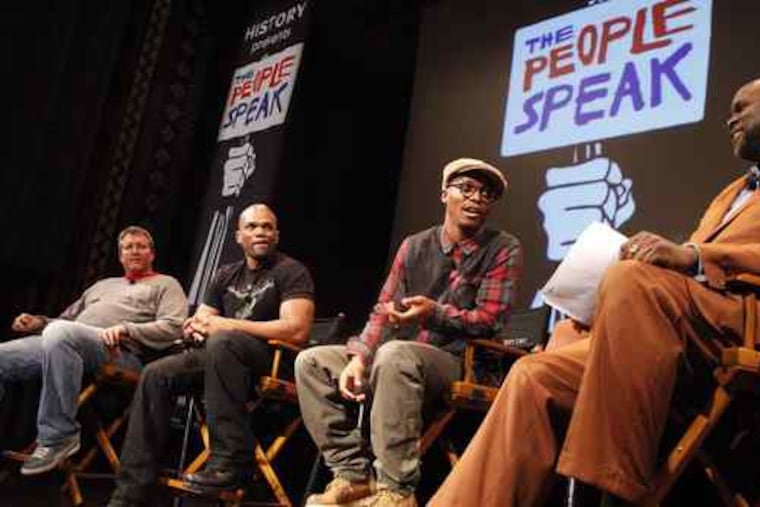A plainer view of our past
America's history has been written not by VIPs, but EPs - everyday people - argues historian Howard Zinn. His books have inspired a star-dusted TV documentary.

On a windy Tuesday evening in November, a student crowd filled the 1,200-plus-capacity Irvine Auditorium on the Penn campus.
They'd come to catch the crème of hip-hop's past (Run-DMC's Darryl McDaniels) and present (Lupe Fiasco) in person and watch footage of John Legend, Bruce Springsteen and Eddie Vedder performing protest songs.
The message: Change isn't a marketing term Barack Obama made up. America's victories of diversity and innovation came not from presidents or governments but from grassroots social movements: from the people.
That's long been the view of Howard Zinn, 87, professor emeritus in the Boston University Political Science Department, historian, writer, and civil-liberties and antiwar activist. Now his books A People's History of the United States and Voices of a People's History have been turned into the provocative TV special The People Speak, of which Penn students were seeing snippets at the Nov. 17 screening. (The show debuts Sunday at 8 p.m. on the History Channel.)
Zinn was executive producer along with Josh Brolin and Matt Damon. Those Hollywood names-above-the-title appear on-screen too, performing dramatic speeches that make up Voices. They're joined by other stars.
Viggo Mortensen reads from farmer Plough Jogger's words leading up to Shays' Rebellion of 1786. Morgan Freeman performs a letter from Frederick Douglass ("The Meaning of July 4th for the Negro," published July 5, 1852) as if he'd written it himself. In the film clips Fiasco and McDaniels read smart and weary words from sons of slaves and antiwar 1960s teens with furious potency.
"These guys say it better than I can," said Chris Moore, yet another executive producer. His credits include Good Will Hunting and American Pie.
"My criterion for the speeches we used, quite simply, was they had to be inherently full of fire and poignancy, not a dull piece of memoir or oratory," said Zinn from Boston, days after the Penn screening. "They had to be relevant to what's going on today."
After the excerpts and live readings, Moore, McDaniels and Fiasco joined Penn professor Tukufu Zuberi in a spirited Q & A.
"I think the most powerful, transforming words come from the people," said McDaniels from the stage. "I'm not of the Republican Party. I'm not of the Democratic Party. I'm of the hip-hop party."
"You get to a point where it's just like, 'There was regular people in history' - it's not all generals and politicians," said Fiasco in a pre-screening chat.
Brolin has played his roles in history, as President George Bush in W. and as murderer / San Francisco pol Dan White in Milk. "I keep getting enlisted," laughs Brolin. He read Zinn's work as a teen but got involved in People Speak through producer and Zinn writing partner Anthony Arnove.
He agreed to coproduce when he attended Voices in New York City, a reading and celebration of A People's History's millionth sold copy. He saw the visceral reactions of the audience to historical material quite different from what kids read in school.
"People reacted to the words as if they were happening now," says Brolin. His aim as producer was to ensure that the film fascinated as well as educated. It is full of tenacious historical revisions - for example, that it was the abolitionists, not conscience, that pushed Lincoln to free the slaves.
"Look, the history we're used to - call it propaganda - is the government's history, not the people's," says Brolin. He says the film doesn't erase traditional history so much as give viewers another version of the same stories. "It's a perspective we can be proactive within because it's about us," he says.
Damon long has had a passion for the Zinn view of history. The Oscar-winning co-screenwriter of Good Will Hunting made Zinn a household name in that film when, as Will Hunting, Damon exclaims, "If you want to read a real history book, read Howard Zinn's A People's History of the United States. That book will knock you on your ass."
Damon's family grew up next door to Zinn and his wife in West Newton, Mass. "To a 9-year-old, he was a really nice guy, the professor who lived next door," says Damon with a chuckle. "The book was a big part of my life not only because it came out when I was 10. It wound up being one of the history books we used in high school."
Will Hunting's words sparked interest in Hollywood, and producers came forward to bring the book to the screen. "We were really intrigued by that idea but didn't know how we'd go about it," says Damon. He says it was Zinn's idea to enlist actors with decided political beliefs. This was no vanity project, Damon says (around a jest that "Brolin is pretty vain"); the actors came because of Zinn and their interest in his ideas.
"The key to People Speak is that change comes from the bottom up; always has, always will," says Damon. "That goes for today, too. We can't wait for Barack Obama to just fix things. We have to be in his ear. That's our job as engaged citizens."
Zinn says he has never viewed his work as partisan, and claims that the Democratic Party is as warlike as the GOP: "We're just saying that the public can't look to presidents to save us or depend on the people on top to initiate important changes."
Zinn asks audiences of The People Speak to consider how presidents of former ages were pushed into the Emancipation Proclamation, the New Deal and the Civil Rights Act of 1964 by grassroots social movements. There, he thinks, lies the key to present and future change.
"Our message is clear," Zinn says. "No one man is a savior. We have to hold his feet to the fire."